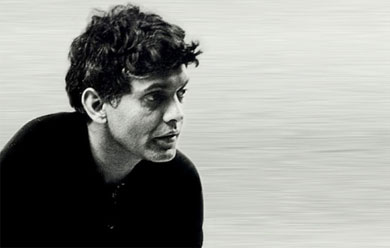By Khaled Ahmed
June 26, 2015

Eqbal Ahmad was born in the village of Irki in Bihar, India in 1933 or 1934
Eqbal Ahmad (1933-1999) overawed with his capacity to speak presciently on global politics. He was wise and forgiving, as I found out after allowing an editorial critical of him in The Frontier Post in the early 1990s. He sent me a letter of mild protest and, after my intensely guilt-ridden apology, came to Lahore, invited me over to his friend Raza Kazim’s house — and actually consoled me.
Now, professor emeritus at Brooklyn College of the City University of New York, Stuart Schaar, has written a carefully researched book on his friend of 40 years, Eqbal Ahmad: Critical Outsider and Witness in a Turbulent Age. They were together as students from 1958 to 1964 at Princeton University and researched their doctorates together in North Africa. Eqbal had earlier done his MA at Forman Christian College in Lahore, after winning a gold medal for his BA. He did this in 1949, after recovering from the trauma of seeing his father killed in Bihar, where he was born in a mid-level farmer’s family, and from seeing Pakistani non-state actors kill one another in Kashmir, where he had gone as a young warrior from the Ahmadi-run Talim-ul-Islam College in Lahore. The first lesson was learned early: Partition was all wrong; India and Pakistan should revert to being one state.
Schaar quotes him on the Kashmir jihad: “Pathans burnt and pillaged Hindu villages, raping women and killing people. I heard stories of similar excesses — killings and lootings, but no rape — being committed on the Muslim villages as well. There were the Muslim Leaguers who had brought me there. Ahmadis had also joined, primarily in order to proselytise. Having no interest in either… I joined the single Communist Party unit led by Latif Afghani. [His] cell was my introduction to the Left.”
In the early 1970s, Eqbal was deep in the anti-Vietnam War movement and got into trouble with FBI chief J. Edgar Hoover “for attempting to kidnap Henry Kissinger”. For those of us who never believed this, here is a quote from the book: “Eqbal proposed that they make a citizen’s arrest of Henry Kissinger and interrogate him, perhaps filming the whole event and then release him…” This was pure fantasy, but the spooks picked it up and made a case out of it that ran as Harrisburg 7 in court but fizzled out soon enough, ably defended by the likes of Ramsey Clark. Eqbal was soon a much-liked orator, surrounded by worshipful students. He was a great speaker and a persuasive chastiser of hegemon America in articles that can be read together with the larger works of Edward Said, Noam Chomsky and Frantz Fanon. When it came to the Middle East, he added to the perceptions of Said and took on his critics, such as Ernest Gellner and Bernard Lewis. After Israel was created, the Jews became a nation; after the Palestinians were thrown out of their land, they too became a nation. Eqbal told Palestinians not to fight but win their land back through peaceful civil protest. How good he was is borne out by this uncanny “prediction” about American comeuppance in Iraq in an article he wrote for Dawn in 1998: “The United States has neither the will nor the resources to undertake the remaking of Iraq. If it does not, the scramble over Iraq may ignite protracted warfare…”
Eqbal was a Marxist but he was also deeply embedded in the matrix of Islamic culture. He chose the Tunisian-born Ibn Khaldun (1332-1406), populariser of Asabiyyah haunting Muslims today, as his patron saint when he planned his Khaldunia University in Islamabad. Schaar tells us how the Khaldunia University dream came to grief after Eqbal berated the “liberal” PM Benazir Bhutto’s father in an encounter at a 1998 event about the creation of Bangladesh: “After Eqbal criticised Zulfiqar Ali Bhutto, his daughter took the stage and defended her [late] father’s policies. Without referring to what Eqbal had previously said. After the session, when Eqbal extended his hand to shake hers, she ignored him and afterwards avoided him.” Eqbal never got the land.
Eqbal rated Tagore above all Indian leaders because of the latter’s opposition to nationalism, without ignoring Gandhi for leading the greatest people’s movement in India, if you count Muslims demanding Khilafat. Eqbal probably caught the irony of Tagore being the writer of three songs that became the national anthems of India, Sri Lanka and Bangladesh.
Towards the end, Eqbal was bored and sad in Pakistan. He had separated from his wife Julie Diamond; he could never make up his mind about marrying the second woman who loved him, the writer Radha Kumar. When he died, Pervez Hoodbhoy wrote: “As they finally wheeled him out of the intensive care unit, the nurse asked if he was my father. No, I said, he was the head of our clan. But there was little point in explaining this was no usual clan, has no blood linkages, and knows no country, religion, or race. Its many thousand members are spread across the continents from Vietnam to the West Bank and Morocco, from India and Pakistan to Europe and North America. Their only bond is a shared belief in human dignity, justice, liberty, and all that is rich and precious in the human experience. Today they mourn Eqbal Ahmad, the man who brought them all together, and who they loved so much.”
Khaled Ahmed is consulting editor, ‘Newsweek Pakistan’
Source: http://indianexpress.com/article/opinion/columns/head-of-a-gentle-clan/

No comments:
Post a Comment